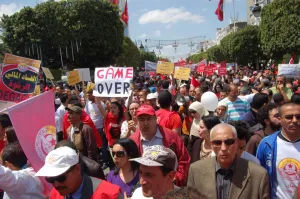It’s a story that rings with a sickening familiarity—a mob of protestors takes to the streets of a capital city, clashing with police and violently expressing a desire that the elected legislature effectively surrender its power to the executive. To the protestors, the government in power has abdicated its legitimacy, and the process by which decisions have been made up to this point is no longer worth preserving. Democracy is no longer the goal; instead, results by whatever means will do.
This isn’t the story of the United States on January 6th, 2021, though. It’s Tunisia right now, where the government’s failure to curb unemployment, corruption, and the spread of COVID-19 has led to widespread dissatisfaction with the small North African country’s parliament. Protests have been ongoing in the country for the past several months, testing its fledgling democracy, which is barely ten years old. Just yesterday, though, that democracy seems to have broken, or come close to it. The country’s president, Kais Saied, fired the Prime Minister and dissolved the parliament, indulging calls in the street for such actions.
Saied’s seizure of power and its dark implications for the future of Tunisian democracy are all the more depressing set against the backdrop of recent Tunisian history and politics. In the early 2010s, Tunisians revolted against the dictatorial regime which had governed the country for decades and established a constitutional democracy.
Though the life of Tunisia’s young democracy has been full of shortcomings and growing pains, it has nonetheless remained a bright spot during a decade of global erosion of democracies. Until now, leaders refrained from extravagant attempts to seize power, preferring to carefully avoid rocking the boat, preserving the fragile young regime.
Of course, all that has changed. What just happened in Tunisia is both like and unlike what happened on January 6th in the United States, although it’s instructive either way. It is impossible to resist remarking on the similarities, namely the seizure (or attempted seizure) of executive power and the protests legitimating it. Those efforts—to bulldoze the legislature and lean on dubious constitutional interpretations to justify it—seem to suggest there is a strategy of choice for seizing power in a struggling democracy. What’s more, both Mr. Trump and Mr. Saied spent months indicating what they would do and stoking the public anger they needed.
But Tunisia is also unlike the United States. Whereas the January 6th insurrectionists stormed the steps of the Capitol building in denial of the reality that Mr. Trump had lost the election, the protestors in Tunisia are motivated by their reality: sky-high unemployment, persistent corruption, and a pandemic still out of control. Tragically, democracy in Tunisia has been unable to meaningfully improve the average quality of life of its citizens. When people are deprived of decent and dignified lives, democracy appears unimportant.
After Mr. Saied’s coup, Tunisians took to the streets again, this time to celebrate. While at the time of writing his victory is not yet certain, as that may depend on whether he enjoys the support of the military, the events of the past twenty four hours are a dangerous sign of what is to come for Tunisia. So too is it a sobering moment, as it becomes increasingly likely that one of the few encouraging democratic developments over the past decade will be extinguished.


Comments
Join the conversation